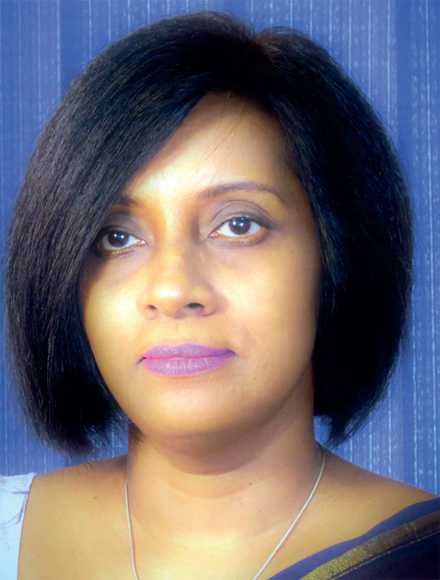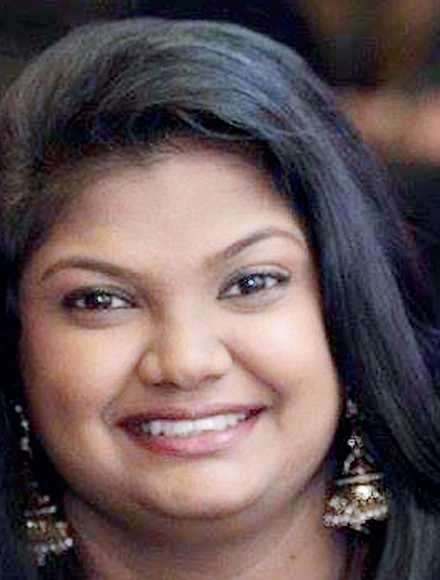Wednesday Feb 25, 2026
Wednesday Feb 25, 2026
Tuesday, 29 September 2020 02:32 - - {{hitsCtrl.values.hits}}

Non-Communicable Diseases Director Dr. Vindya Kumarapeli

Consultant Community Physician Dr. Ishanka Talagala
By Dr. Dineshani Hettiarachchi
This year World Heart Day is commemorated on 29 September. This is an opportunity to spread awareness among the general public to inculcate heart healthy attitudes and behaviour. Prevention and control of cardiovascular diseases is one of its fundamental facets. This year the theme is ‘Use the Heart to beat Heart Disease’.
In this backdrop we spoke to Non-Communicable Diseases Director Dr. Vindya Kumarapeli and Consultant Community Physician Dr. Ishanka Talagala on some of the initiatives aimed at creating awareness and to mitigate risk factors.
To commemorate this day, the Directorate of Non-Communicable Diseases, Ministry of Health and the Sri Lanka College of Cardiologists have organised a series of programs. The purpose of this year’s World Heart Day celebrations is to educate the public about heart disease and its main causes such as; high blood pressure and unhealthy lifestyle choices, and to educate the public on the benefits of early detection of heart disease to curb its associated mortality and morbidity.
In addition, another objective of this program is to direct the public to utilise healthy lifestyle centres established in primary healthcare institutions. These centres screen all adults 35 years and above for Non-Communicable Diseases and associated risk factors.
NCDs are among the leading causes of death and disability world over. This includes cardiovascular diseases, diabetes, cancer, chronic respiratory diseases and chronic Kidney disease. Among them Cardiovascular Diseases (CVD) are the leading cause of death worldwide.
In 2016 alone CVDs accounted for 31% or one-third of all deaths worldwide, 85% of which were due to heart attacks and strokes. In the local context NCDs accounted for 83% of the total deaths in Sri Lanka in 2016 and among them cardiovascular diseases accounted for 34% or one third of all deaths.
Major behavioural risk factors for CVDs include unhealthy diet, physical inactivity, tobacco use, and alcohol use.
Reducing these modifiable behavioural risk factors can prevent many cardiovascular as well as other NCDs. Most CVDs are associated with high blood pressure which is also an intermediate factor in other NCDs. One of Sri Lanka’s main sustainable development goals is to reduce the number of premature deaths due to NCDs by 25% by 2025 i.e. deaths among people between the ages of 30 and 70 years.
Dr. Kumarapeli stated that the National Program for Control and Prevention of Non-Communicable Diseases in Sri Lanka is implemented by the Directorate of Non-Communicable Diseases of the Ministry of Health.
The National Program has four main strategies: Advocacy, leadership and partnership; health promotion and minimising the four major risk factors mentioned above among the people, strengthening the health system for early detection of NCDs through screening and treatment. The week starting from 28 September to 2 October will focus on activities to promote heart health to commemorate World Heart Day.
Hypertension or high blood pressure is also one of the major reasons for mortality and morbidity globally as well as in Sri Lanka. Blood pressure measurement of 120/80mmHg is considered as normal, while, the systolic blood pressure (upper value) being 140 or more, or diastolic blood pressure (lower value) being 90 or more is considered as high blood pressure or hypertension. Hypertension is largely asymptomatic.
Therefore, any individual could be suffering from hypertension without showing any symptoms. Thus, it is also known as a ‘silent killer’. Therefore, any individual to know whether he/she is suffering from hypertension, regular monitoring of his/her blood pressure is essential.
High blood pressure is a major risk factor for heart attacks, heart failure and stroke. Long standing hypertension, either undetected or uncontrolled, will result in renal failure, blurred vision and blindness, peripheral artery disease (issues related to the blood supply to hands and feet), etc.
Based on the STEPS survey (National NCDs risk factor survey, conducted every five years by the Directorate of NCD; last was conducted in 2015, next STEPS survey will be conducted in October 2020) results, 26% (one in every four persons) Sri Lankan adults are suffering with hypertension, which indicates that hypertension is a serious issue among the Sri Lankans. The survey also reported that, 31% (one in every three) have not ever checked their blood pressure, which is a serious issue.
Another alarming finding from the survey was that 21% of hypertensives (one in five of hypertensives) were not taking regular treatment for their condition, which would ultimately result in complications mentioned above and even death.
Tobacco use (smoking or smokeless), alcohol use, physical inactivity and unhealthy diet are the behavioural risk factors of hypertension. Considering the unhealthy diet, high salt intake has a direct association with high blood pressure. Sri Lankans are currently consuming more than twice the daily recommendation of salt intake per person, which is only 5g per person per day (a levelled tea spoon).
Furthermore, a recent national survey conducted by the WHO country office, Sri Lanka reported that 50% of the Sri Lankans add salt while cooking rice. Therefore, Sri Lankans should be educated and empowered to limit their daily salt intake and stop adding salt to rice.
Hence, the Directorate of Non Communicable Diseases requests all the Sri Lankan adults to get their blood pressure checked regularly and if you are already diagnosed with hypertension, please seek medical advice, adhere to the treatment and management plan along with your lifestyle modifications.
Activities planned under this initiative are:
Public blood pressure testing – During the week starting from 28 September.
Medical officer (NCD) in all districts have been instructed to liaise with the Medical Officers of Health (MOH) to implement a program to measure blood pressure in public places such as railway stations, supermarkets and central bus stands and in workplaces such as police stations and divisional secretariats, etc.
To liaise with the Medical Officer-in-Charge of the Primary Health Care Institutions to check the blood pressure of patients who come to the OPD through the Healthy lifestyle Centers (HLCs) established in those hospitals.
The heads of hospitals have been informed to check the blood pressure of all their staff.